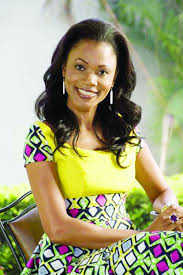 For the last 2 weeks, Nigerian’s have remained united on one thing. #Bringbackourgirls. Our loud voices have gathered international attention and woken up our government from their slumber. Although, I have added my voice to the cause, I have been unsure how best to effectively contribute to the discussion.
For the last 2 weeks, Nigerian’s have remained united on one thing. #Bringbackourgirls. Our loud voices have gathered international attention and woken up our government from their slumber. Although, I have added my voice to the cause, I have been unsure how best to effectively contribute to the discussion.
In my opinion, the abduction of over 200 girls, 2 weeks ago from the Government Secondary School in Chibok, is not only a serious indictment on the level of security in this country, but our governments lack lustre approach to securing their release also leaves us to assume one thing- our elected leaders cannot (and seem uninterested in) protecting us.
Besides stating the obvious, I decided to add, what I hope is some real dimension to the conversation. I contacted Funmi Iyanda, a renowned television presenter and activist to gain her views on the key issues which perhaps contributed to the girls abduction and what we should be focused when, hopefully, they are released.
GE: Some have argued Boko Haram’s abduction of the girls is based on their belief that women should not be educated and instead should serve their husbands and look after children at home. Why do you believe educating women is important?
FI: Its oversimplification to think the abduction is to stop or discourage girl education. Boko Haram murdered over 5o boys in their school a few weeks before the abduction. They are bombing, murdering and abducting girls, boys, men, women, muslims, christians..everybody. What is happening with Boko Haram is an insurgency with roots in inequality, social decay, hijack of religion and some honest to god organised crime and political profiteering. Its a disease which has been allowed to fester for decades now mutating into cells of terror. That said, girls must be educated first and foremost because they are human and equal participants in the survival of our specie. Education elevates the human consciousness and prepares people for the task of building their communities and actualising the self. As equal participants in family, community, national development, the contribution of women is crucial. There is no record anywhere in history of any nation that became great where its women are repressed and prevented from education. The nation may have natural resources and thus money but it never spearheads the evolution of the world as we know it, nor does it truly participate in the growth and advancement of our specie. Usually, it dies. Girls must be educated.
GE: Alexis Okeowo’s recent article in the New Yorker, claims that when it comes to Boko Haram our government cannot be trusted (following the Military’s recant that it had rescued some of the kidnapped girls). What can we as women do to keep ourselves and our daughters safe and at the same time keep our government accountable?
FI: We cannot keep ourselves and our daughters safe from terrorists, that will require the sort of military hardware and training the average person does not have. Its important to understand that there is no individually insulating solution except migrating. The world post 2008 economic collapse is anti immigration, no one wants the burden of others and immigration has its inherent socio political and emotional implications. We must hold our government whom we have entrusted our common wealth and security accountable. We must make them keep us safe, if they cant, we must throw them out to find those who can keep us safe and reverse the underlying causes of insurgency. We must keep changing bad leaders until we get good leaders and build the institutions to safeguard our humanity and well being. We must find, protect, police and keep such leaders in every sphere; political, economic, religious, business and so on. We must hold all and each other accountable. That is what will keep ourselves, our daughters, ours sons and our communities safe.
GE: Recently, Malala Yousafzai a Pakistani, school pupil was shot by the Taliban for being brave enough to go to school. How can Nigerian women stand against the Boko Haram insurgency?
FI: By standing up to their government. Ordinary citizens cannot fight faceless insurgents. Our government with military and intelligence resources entrusted upon them with our common wealth must be made accountable. If and when the government truly faces up to the task of crushing insurgency and reversing the sort of conditions that encourage its growth, then the women and indeed all citizen will and must get behind the government.
GE: There have been peacefully staged protests and a petition which is being signed in respect of pushing the government to do more to find the girls. Do you feel this goes enough to engage the government? What more can we do?
FI: It is fine but it is not nearly enough. We have to form a coalition between civil societies, labour unions, trade unions, youth groups, market leaders, transport leaders, religious leaders and get everyone behind agreed strategies to force accountability in government and appropriate response to the insurgency and its devastation on Nigerian lives.
GE: In the absence of real governance, Nigerians have learnt to fend for themselves, unfortunately the drawback to this is apathy over issues that don’t seem to affect us directly. Up until recently, the kidnapped girls seemed to be receiving more international than local attention. How can we cure this level of apathy? What can we do to bring a united front against Nigeria’s issues?
FI: Our apathy is an appalling shame with roots deep in cultural self loathing and inability to truly engage with the nation state we were bequeathed. That apathy, if not checked at some point will eventually consume us, it is not an alarmist assertion, it is just the order of life. The decay is not stagnant, it worsens daily and pushes on to a dangerous point. Whether this will be the generation to check it is the real challenge at hand. We can bring a united front only by embracing our Nigerian reality and refusing to participate in the huge racket Nigeria is. We refuse to participate, we rally support across board and we engage with the large mass of our people and engage/challenge our leaders across board.
GE: What is your current opinion of women in government? Do you feel enough is being done by them to encourage women empowerment and protect our rights? How can we help them to help us?
FI: The women in government are same as the men in government. The system is too broken to produce women who can empower or protect other women. We can help them to help us by changing the way things work. Our issues are beyond gender now. The plight of women, children, the young and the aged are all tied to a country with structures too broken to protect its most vulnerable members. Women and men must come together to save Nigeria.
_________________________________________________________________________________________
Please visit www.chibokgirls.com for more information on #bringourgirlsback

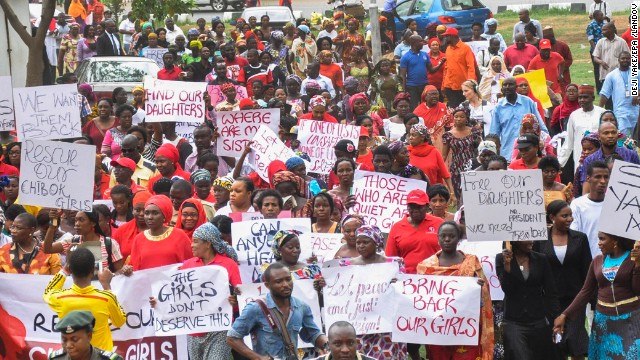
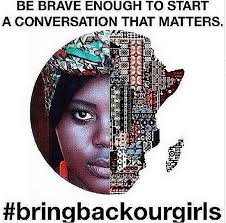
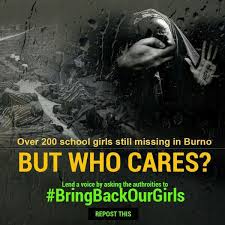

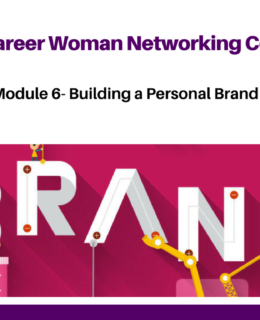

1 Comment
Informative article, just what I wanted to find.
Leave a Reply